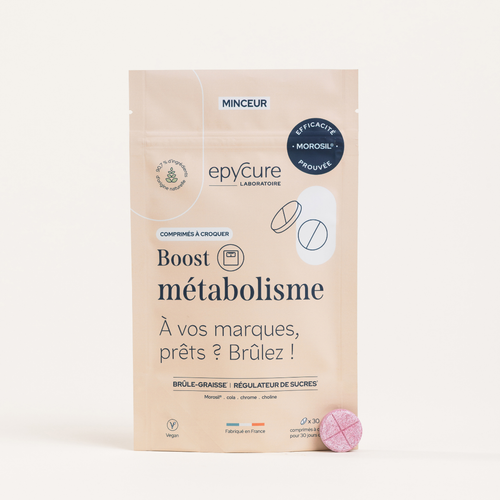Ultra-processed products , excessive sugar consumption and an increasingly sedentary lifestyle , our eating habits have deteriorated considerably over the years, favoring foods that are ever richer in sugar, to the detriment of raw, fresh and seasonal products .
Overconsumption of sugars causes large spikes in blood sugar , which are accompanied by short- and medium-term consequences for our bodies. Regulating blood sugar levels then becomes a national health challenge , but one that remains within our reach if we have all the keys. We explain everything to you.
What is the effect of sugar on our body? What are the risks?
Very often demonized by “trendy” diets , sugar is nevertheless essential for the proper functioning of our body . Providing energy and ensuring proper intestinal transit, it represents more than 50% of daily caloric intake . At first glance, one might wonder why we should pay so much attention to it?
One thing is certain, not all carbohydrates should be demonized , but it is important to identify those that do us good and, conversely, those that bring us more pleasure than good to our body, by contrasting slow sugars with fast sugars . Indeed, all the subtlety lies in the type of sugars we consume. Fast sugars (refined white sugar, cakes, sweets, etc.) cause large spikes in blood sugar and insulin causing fatigue , cravings , weight gain , and in the long term, an increased risk of diabetes and cardiovascular disease if they are consumed excessively. Conversely, slow sugars (wholemeal pasta, rice, avocado, etc.) will limit this spike in blood sugar and provide constant energy throughout the day, to avoid the famous “slump” after lunch.
Carbohydrates, or more commonly called “sugars”, each have a glycemic index (GI) associated with them. It is this index that defines whether it is a slow or fast sugar: the higher it is , the more quickly the sugar will be digested and arrive in the blood. We often wrongly associate the naturalness of a food with a low glycemic index, which is not always the case. On the other hand, a white sugar will necessarily be “ fast ” but this is also the case for honey, which has roughly the same blood sugar peak, although they bring other benefits to our health such as strengthening our immune system . Coconut sugar or agave syrup are more recommended because they have a lower glycemic index, however it is important to take into account other factors , such as their caloric index .
Excessive consumption of carbohydrates can have a significant impact on the “natural” aging of the body: by oxidizing, cells do not renew themselves as well, or even at all, thus impacting the body both externally (for example, premature aging of the skin ) and internally ( fatigue of the pancreas , increased risk of certain cancers , etc.)
Although diets like the “ketogenic” (or keto ) diet are becoming more and more popular in our society, it is essential to remember that these are above all “ trends ” and that they are not suitable for everyone . For example, if the ketogenic diet has proven its worth in the case of cancers (indeed, cancer cells feed on sugars, it is recommended to reduce its consumption), it is important to qualify this demonization of carbohydrates by certainly avoiding their overconsumption but above all, by favoring their diversity and their naturalness , in order to bring other benefits to our health at the same time.
What is blood sugar and the glycemic index?
Blood sugar indicates the level of sugar present in the blood . In normal conditions, it is between 0.7 and 1.1 g/L , which is where the body functions optimally for the maintenance and activity of organs . Events will influence this level towards hypoglycemia (<0.6 g/L) or hyperglycemia (>1.1 g/L), the prolonged and chronic maintenance of which would have a negative impact on the functioning of the body. Its variation is multifactorial: diet , treatment , illness , physical activity , emotions , etc.
The glycemic index of a food allows us to assess its hyperglycemic power . The higher the glycemic index of a food, the greater the peak in blood sugar after ingestion, which will have effects on the entire body. Throughout the day, the body tries to maintain normal blood sugar levels to ensure optimal functioning. Consumption with a glycemic index that is too high can cause long-term dysfunctions in the body.
To guide you, here are some examples of foods according to their glycemic index:
Whole wheat pasta, red beans, brown lentils, peaches, apple, orange, tomatoes, apricot.
Oatmeal, dark chocolate, banana, melon, raisins, rice, semolina, white bread.
Watermelon, pumpkin, honey, fries.
To go further, the liver is the control center: its role is to manage the use of glucose by the body according to its needs to maintain normal blood sugar levels . This adaptation is done in response to glycemic hormones: insulin and glucagon .
- Insulin
You may have already heard about it, insulin is also called “ satiety hormone ” because it is secreted by cells in the pancreas to limit the rise in blood sugar levels after a meal. It is the only hypoglycemic hormone that promotes a return to normal blood sugar levels . It thus modulates the sensation of hunger towards a satiety effect .
- Glucagon
Glucagon, also known as the “ hunger hormone ,” is, unlike insulin, hyperglycemic . Produced by the pancreas in response to a drop in blood sugar, its secretion increases blood sugar levels by stimulating appetite .
Their function is essential , an alteration causes risks to the health of the individual: appearance of diseases, cardiac and neural disorders, without forgetting the most well-known: diabetes. It is directly linked to a hormonal alteration , in particular of insulin, which characterizes hyperglycemia. Its manifestation comes from two independent factors: genetic (Type 1 Diabetes) and acquired (Type 2 Diabetes).
- Type 1 diabetes
This is an autoimmune disease caused by the elimination of insulin-producing cells, and is therefore not influenced at all by diet . Sugar then remains in the blood and accumulates. Only insulin therapy , i.e., insulin injections, can compensate for this lack of production by the body.
- Type 2 diabetes
In other words, “ diabetes mellitus ,” it appears following a metabolic disturbance due to prolonged excess glucose in the blood, mainly caused by poor diet . In this case, the treatment is completely different and in three progressive stages:
- Changes in lifestyle
- Taking antidiabetic medications
- Insulin therapy
In addition to having to follow a lifelong treatment, they have an impact on people's health by multiplying the risk of certain diseases such as atherosclerosis, strokes or renal failure... The lifestyle of affected patients is strongly impacted, an adaptation of the quality of life is then essential , in particular through a balanced diet and physical activity .
7 tips to naturally regulate your blood sugar:
Who hasn't rolled their eyes when reading "Practice regular physical activity" or "Walk at least 10,000 steps a day"? Yet, sometimes the simplest things are the most effective . By moving, the body will consume energy from the body's sugars, initiating the drop towards normal blood sugar levels but also reducing the risk of diseases linked to this glycemic imbalance. Cardio , swimming , weight training or simply a ten-minute walk after a meal... Everything is good for your body as long as you're moving! You just need to find the activity that's right for you .
Drinking 2L of water a day isn't just a hassle. Water is one of the best ways to regulate your blood sugar levels, helping to eliminate excess sugars from our bodies. As a supplement, apple cider vinegar has been proven to regulate blood sugar and may be able to improve insulin sensitivity . A tablespoon in a large glass of water before each meal can quickly and easily improve your blood sugar balance .
Excess glucose is, in part, due to food : pasta, brioches, sweets, white bread… They cause strong variations in blood sugar in a short time due to their high glycemic index: no doubt, these are fast sugars . Foods with a low glycemic index, on the other hand, help reduce strong glycemic variations, which will also affect satiety and appetite . Often, this change in consumption is not welcome because it is considered as eating without pleasure when in reality, this change is not so obvious. Starchy foods can be replaced by whole grains , bulgur or rice , white bread by wholemeal bread … Cooking also plays a role ! Choose pasta cooked al dente rather than very cooked .
Other foods also have a positive impact on regulating blood sugar: apple cider vinegar , fenugreek seeds, lentils, lemon or even spices like ginger and cinnamon.
Carbohydrates or not, fiber has a major impact on regulating blood sugar. Their composition means that they are not digested by the body and take up space in the stomach . Since they are not digested, they have no effect on blood sugar fluctuations but can help regulate it.
By taking up space in the stomach, fiber will influence the feeling of satiety . By consuming it at the beginning of a meal, the body will prepare for the glycemic peak, which will improve digestion and insulin secretion while limiting the amount of food intake.
Sleep at least 7 hours a night ? Sleep contributes to the proper functioning of the metabolism, the elimination of toxins and even psychological and intellectual recovery ... Respecting the circadian rhythm is essential because, without it, the body would be disrupted, particularly in terms of blood sugar where glycemic hormones would do a bit of everything, causing a significant drop in blood sugar, encouraging people to wake up to eat. “ By improving one, we improve the other ”, respecting your internal clock means limiting imbalances in the body .
Studies have shown the link between stress and hyperglycemia . During stress, whether acute or chronic, the body secretes stress hormones (cortisol and adrenaline). These hormones will increase blood sugar levels to very high levels. Methods such as sport , meditation , cardiac coherence or even sophrology allow you to reduce your daily stress easily and sustainably.
Magnesium is known to affect insulin activity . Studies have shown that consuming this mineral helps reduce insulin resistance , which is considered a pre-diabetic condition. Consuming foods rich in magnesium is therefore a natural solution for regulating blood sugar levels: bananas, dark chocolate, legumes, dried fruits, etc.
💡 Insulin resistance is an adaptive phenomenon linked to the body's excessive use of insulin. The more prolonged and/or chronic the episodes of hyperglycemia, the more the body will become accustomed to them, thus leading to a decreased response to this hormone.
Blood sugar hormones are subject to chronobiology, that is, the body's biological rhythm. Regular meals help maintain hormonal balance , thus preventing any dysfunction that could negatively affect blood sugar regulation.
In short, it is important to take care of your body holistically, that is, not only through diet as we often see, but also through rest, relaxation and movement which remain just as essential for regulating your blood sugar.
In addition to a healthy lifestyle , you can opt for Metabolism Boost . These delicious blueberry-flavored chewable tablets will help you regulate your blood sugar levels thanks to the presence of chromium, while helping to dislodge accumulated fat thanks to the synergy of Morosil® (Moro orange) and cola.
Now everything is in your hands!



